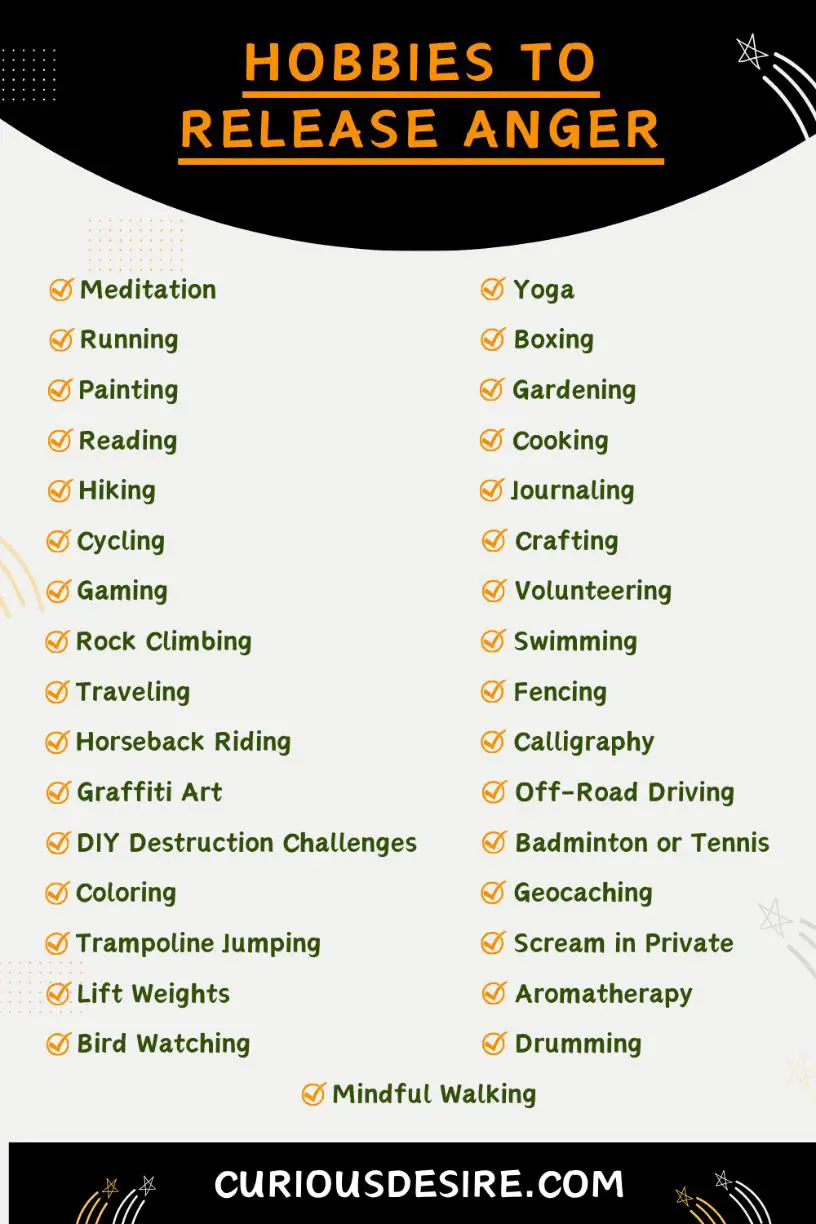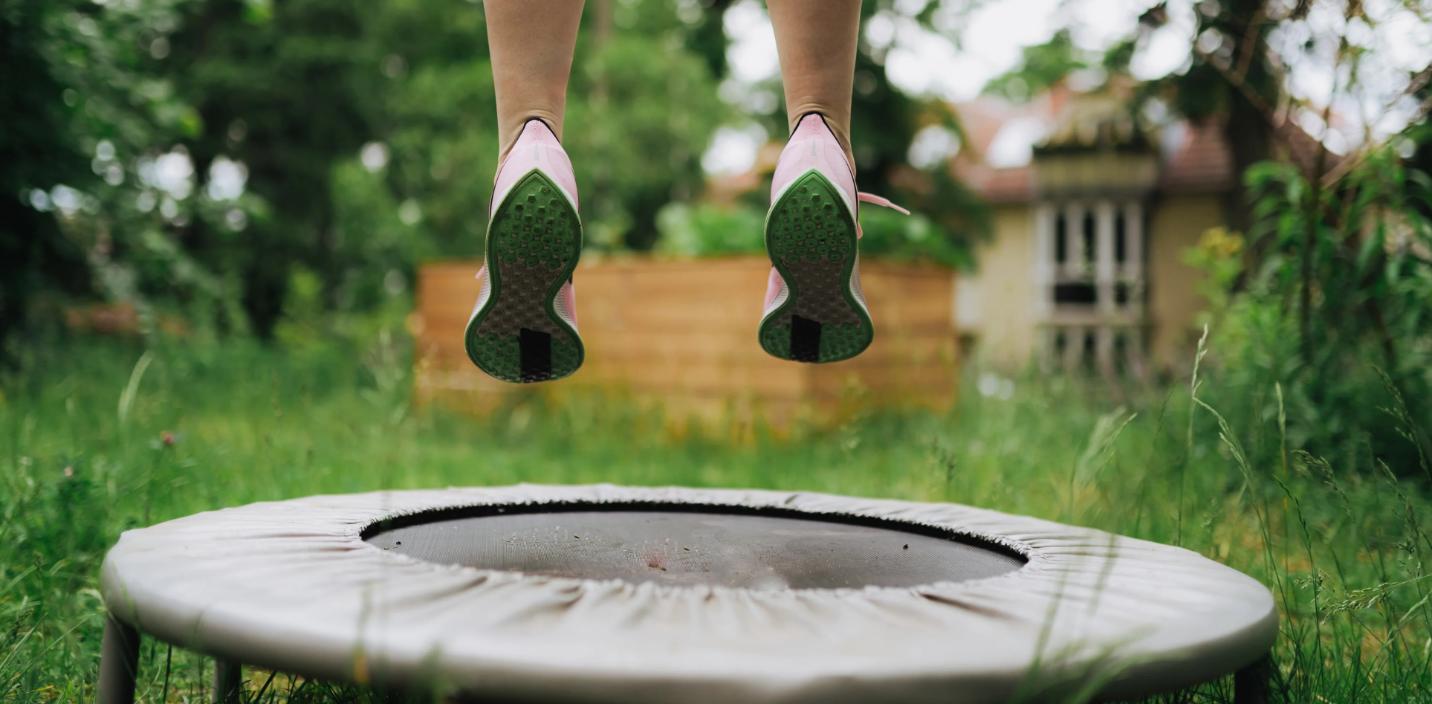In our hectic lives, getting pissed off can be a usual occurrence, but finding healthy ways to release anger is essential for emotional well-being, both for yourself and others
Hobbies provide a constructive outlet, offering a chance to unwind and regain balance.
This article will highlight diverse hobbies, from physical activities to creative pursuits, that serve as effective tools for anger release.
Discovering the right hobby can be transformative for a healthier, more balanced lifestyle.
Here are the 5 most effective hobbies to release anger:
- Boxing
- Running
- Horse Riding
- Lift Weights
- DIY Destruction Challenges
[toc]

Hobby 1: Meditation
Meditation involves practicing mindfulness to calm the mind and achieve a state of deep relaxation.
By focusing on the breath, sensations, or a specific object, individuals can cultivate a heightened sense of awareness and inner peace.
This practice is beneficial for anger issues as it allows individuals to distance themselves from immediate emotional reactions.
Meditation also encourages an unbiased observation of thoughts and feelings, providing a space for reflection and emotional regulation.
Hobby 2: Yoga
Yoga is an excellent activity for anger management as it integrates relaxation techniques with physical exercise.
It combines physical postures, breath control, and meditation to promote physical and mental well-being.
The emphasis on controlled breathing and mindfulness helps individuals stay present, reducing the likelihood of reacting impulsively to anger triggers.
Regular yoga practice establishes a sense of balance, calmness, and self-awareness.
Hobby 3: Running
Running is another highly effective way to channel anger into a productive workout. The physical exertion releases endorphins, the body’s natural mood elevators, promoting a sense of well-being.
Additionally, setting and achieving running goals can boost self-esteem and provide a sense of accomplishment, further contributing to anger management.
Hobby 4: Boxing
Boxing is a high-intensity sport that involves both physical exertion and strategic thinking. Therefore, engaging in boxing allows individuals to release built-up tension through controlled and focused movements.
It is not just about hitting a punching bag; it’s a combination of cardiovascular exercise and feeling good when you get better at mastering technique.
When you practice boxing, you also learn to control your emotions better and have better control over yourself. It’s like learning to manage your feelings and behave better.
Hobby 5: Painting or Drawing
Expressing emotions on canvas or paper through painting or drawing is a therapeutic way to manage anger.
Sometimes, it’s hard to say how you feel with words, but with art, you can show it. It’s like turning your emotions into something beautiful or meaningful.
Therefore, engaging in creative activities allows individuals to process and externalize their anger in a controlled and constructive manner.
Hobby 6: Gardening
Gardening involves connecting with nature and enjoying the therapeutic benefits of nurturing plants.
The act of planting, cultivating, and caring for plants can be a meditative process, which gives a sense of responsibility and connection to the natural world.
Gardening offers a peaceful and grounding experience, helping to alleviate anger through a harmonious connection with the environment.
Hobby 7: Reading
Escaping into a good book provides a mental and emotional retreat from stressors. Reading allows individuals to immerse themselves in different worlds, temporarily distancing them from sources of anger.
Engaging in a captivating story promotes relaxation and can shift focus away from negative emotions.
According to a 2009 study at the University of Sussex, reading can reduce stress by up to 68%. This research, which mentions NAMI California, highlights the positive impact of reading on overall well-being.
Reading also enhances cognitive function and imagination, contributing to overall well-being and stress reduction.
Hobby 8: Cooking or Baking
Channeling energy into creating delicious meals through cooking or baking is a productive way to manage anger.
The focus on preparing ingredients and following recipes provides a structured and rewarding activity.
The sensory experience of cooking, along with the satisfaction of enjoying a homemade meal, can positively impact mood.
Also, if you share the food with others, it can make you feel connected and proud.
Hobby 9: Hiking
Getting outdoors and enjoying the serenity of nature through hiking is another excellent way to release anger.
Physical activity in natural surroundings provides a change of scenery and a break from daily stressors.
The rhythmic motion of walking, combined with the beauty of the outdoors, promotes relaxation and can help individuals gain perspective on their emotions.
Hobby 10: Journaling
Writing down thoughts and feelings in a journal is a therapeutic practice for processing emotions. Journaling provides a private space to express anger, explore its roots, and reflect on potential solutions.
The act of putting thoughts on paper can bring clarity and perspective, facilitating emotional release.
Regular journaling promotes self-awareness, helping individuals better understand and manage their anger triggers and responses.
Hobby 11: Cycling
Taking a ride on a bicycle is a physically invigorating hobby that helps clear the mind and provides a sense of liberation.
Cycling combines cardiovascular exercise with the pleasure of exploring different landscapes. The rhythmic pedaling can be meditative, offering a space for individuals to process anger and frustration.
The sense of speed and freedom contributes to an overall feeling of freedom.
Hobby 12: Crafting
Engaging in crafting activities, such as knitting or woodworking, allows individuals to create something with their hands.
The tactile nature of crafting provides a sensory experience that can divert attention from anger.
The focused concentration on the task at hand promotes mindfulness and can serve as a form of active meditation.
Hobby 13: Gaming
Playing video games can be a good way to take your mind off things when you’re feeling down.
When you play, you go into a different world and get to do fun and challenging things. It’s like taking a break from real life.
Games that need strategic thinking can even make your brain work better, and give you a sense of achievement.
But remember, it’s important to do other things too for your overall well-being. Balance is key!
Hobby 14: Volunteering
Helping others through volunteer work can be a fulfilling way to shift focus away from personal anger.
It gives you a sense of purpose and makes you feel connected to a bigger group of people.
Likewise, contributing to the well-being of others creates a positive feedback loop, enhancing feelings of empathy and satisfaction.
Hobby 15: Rock Climbing
Rock climbing is an adventurous and physically demanding hobby that requires focus and strategic planning.
Climbing provides a challenging outlet for physical energy while demanding mental concentration.
Crossing the obstacles and reaching new heights can instill a sense of accomplishment, helping to alleviate feelings of anger.
Additionally, the adrenaline rush and connection to nature during rock climbing contribute to a positive emotional experience.
Hobby 16: Swimming
Diving into the water and engaging in swimming activities is a therapeutic way to release stress and anger.
The rhythmic motion of swimming, combined with the buoyancy of water, creates a calming effect on the body and mind.
The meditative quality of swimming can help individuals relax and let go of tension. Swimming also provides a full-body workout, thus contributing to overall mental and physical well-being.
Hobby 17: Traveling
Exploring new places through traveling offers a fresh perspective and an opportunity to break routine.
It helps people grow and get better at adapting to new things by taking them out of their usual comfort zones.
Also, exposure to different cultures and environments can broaden one’s understanding, reducing the impact of anger triggers.
The excitement and novelty associated with travel contribute to a positive shift in mood.
Hobby 18: Fencing
Engaging in the controlled and strategic physical activity of fencing provides an outlet for pent-up energy and frustration.
Fencing requires precision, focus, and quick decision-making, diverting attention away from negative emotions.
The structured nature of the sport encourages discipline and self-control, contributing to better anger management.
The competitive aspect of fencing also provides an opportunity for healthy expression of aggression.
Hobby 19: Horseback Riding
Being with animals and riding a horse outdoors is a great way to relax. Riding needs focus, balance, and talking to the horse, which makes you more aware of the present moment.
The smooth movements of riding can calm you down and release tension. When you bond with the horse in a peaceful place, it makes you feel good inside.
Also, when you ride a horse at a faster pace, it helps release anger. The rush of speed and the connection with the horse can turn negative energy into a positive experience.
Hobby 20: Calligraphy
Focusing on the art of beautiful writing through calligraphy is a mindful and artistic pursuit. Calligraphy provides a meditative experience.
The deliberate and controlled movements involved in calligraphy can help individuals positively channel their energy.
The aesthetic satisfaction of creating visually appealing written art adds to the therapeutic benefits of this hobby.
Hobby 21: Graffiti Art
Creating expressive graffiti allows individuals to channel anger into artistic expression.
Graffiti art is a form of visual communication that enables the artist to convey emotions in a vibrant and impactful way.
Engaging in graffiti art provides a non-traditional outlet for self-expression, allowing individuals to externalize their feelings in a controlled environment.
The creative process can be both cathartic and empowering.

Hobby 22: Off-Road Driving
Driving off-road in tough terrains is a physical and exciting way to deal with anger.
The thrill of off-road driving gives a natural boost to your mood by releasing adrenaline.
Concentrating on navigating through rough landscapes takes your mind off negative feelings.
Off-road driving is like an adventure that makes you feel accomplished and happy.
Hobby 23: DIY Destruction Challenges
Setting up controlled environments for breaking objects in do-it-yourself (DIY) destruction challenges can be a unique and unconventional way to release anger.
This hobby involves creating scenarios where individuals can safely vent anger by breaking items in a designated space.
The physical act of destruction provides a release of energy, and the controlled nature of the activity ensures safety while allowing for emotional expression.
Hobby 24: Badminton or Tennis
Engaging in sports like badminton or tennis offers a combination of physical activity and strategic gameplay.
These racket sports require focus, quick reflexes, and concentration, providing a constructive outlet for anger.
The competitive aspect allows individuals to channel their energy into the game.
Additionally, the social aspect of playing with others can contribute to a positive emotional experience.
Hobby 25: Coloring Books for Adults
Hobby 26: Geocaching
Combining outdoor exploration with treasure hunting using GPS, geocaching is an adventurous and interactive hobby.
Geocaching involves searching for hidden containers (caches) in various locations, promoting physical activity and problem-solving skills.
The excitement of discovering hidden treasures and the thrill of exploration can distract individuals from anger triggers, providing a positive and engaging experience.
Hobby 27: Trampoline Jumping
Releasing energy and stress through bouncing exercises on a trampoline is a dynamic and fun activity.
Trampoline jumping provides a cardiovascular workout while allowing individuals to experience the joy of bouncing and flipping.
The physical exertion releases endorphins, contributing to a more positive mood.
The playful nature of trampoline jumping can help individuals let go of tension and enjoy a lighthearted and energetic release.
Hobby 28: Scream in Private
In our anger, the natural response is to scream, yes, but we just don’t want to do it due to social pressure. The good part is, what if nobody really knows or hears your scream?
So yeah, go private and scream at the top of your throat to release all the bottled-up anger.
It will help release emotional energy, providing a sense of immediate relief. It is crucial to ensure privacy to avoid alarming others and to use this method responsibly.
Hobby 29: Lift Weights
Lifting weights as a hobby involves doing resistance training to build strength and endurance.
When you lift weights, it gives you a way to deal with anger by putting your energy into controlled and repetitive movements.
Focusing on the right techniques for weightlifting can also help take your mind off negative feelings.
Plus, the feeling of achieving goals and getting physically stronger from weightlifting can make you feel happier.
Hobby 30: Aromatherapy
Aromatherapy involves using scents and essential oils to influence mood and promote relaxation.
Aromatherapy can be practiced through diffusers, scented candles, or essential oil applications. Certain scents, such as lavender or chamomile, are known for their calming properties.
Incorporating aromatherapy into daily routines can create a soothing environment, aiding in stress and anger management.
Hobby 31: Bird Watching
Bird watching is a tranquil outdoor activity that promotes mindfulness and connection with nature.
Observing birds in their natural habitat requires patience and focus, diverting attention from anger triggers.
The peaceful experience of bird watching can provide a sense of serenity and appreciation for the beauty of the natural world, contributing to emotional well-being.
Hobby 32: Drumming
If you’re angry and feel like hitting someone on the head, it’s better to channel that anger into playing an instrument with all your might.
Playing drums or joining drum circles offers a rhythmic and energetic way to express your emotions.
Drumming can be both physically and emotionally cathartic, allowing you to release tension by striking drums or percussion instruments.
The rhythmic patterns of drumming can put you in a meditative state, promoting relaxation and stress relief.
Hobby 33: Mindful Walking
Practicing mindful walking involves focusing on each step and being fully present in the moment during a walk.
This form of walking meditation promotes awareness of the surroundings, breath, and sensations in the body.
Mindful walking can be a simple yet effective way to manage anger by redirecting attention away from negative thoughts.
Hobbies To Release Anger – FAQs
1. How do I stop feeling angry?
Stopping anger involves recognizing and understanding the triggers.
Practice deep breathing, take a break, and try to gain perspective.
Shift your focus to positive thoughts and, if needed, consider seeking professional help or counseling.
2. What helps relieve anger?
Relieving anger involves finding healthy outlets. Physical activities, creative pursuits, and mindfulness techniques like yoga or meditation can help.
Expressing feelings through communication or seeking support from friends and family can also provide relief.
3. What are 100 ways to handle my anger?
Handling anger involves various strategies. A few examples include deep breathing, counting to ten, journaling, going for a walk, practicing mindfulness, seeking therapy, engaging in hobbies, and learning to communicate assertively.
The key is finding what works best for you.
4. Why do I get angry so easily?
Getting angry easily can be influenced by various factors, including stress, unmet expectations, past experiences, or underlying mental health issues.
Identifying triggers and exploring coping mechanisms can help manage anger more effectively.
5. What are female anger disorders?
While not exclusive to females, anger disorders can manifest similarly in both genders.
Disorders like intermittent explosive disorder (IED) involve recurrent outbursts of aggression and anger that are disproportionate to the situation.
Seeking professional guidance is crucial for diagnosis and treatment.
6. What is the root of anger?
The root of anger is often complex and can stem from various sources, including unresolved trauma, unmet needs, unrealistic expectations, or communication difficulties.
Exploring these underlying issues with self-reflection or professional assistance can be essential in addressing anger at its root.
7. What is the psychology of angry people?
Anger in psychology is often seen as a response to perceived threats or injustices.
Angry people may have difficulty managing stress, regulating emotions, or expressing themselves effectively.
Exploring the psychological aspects through therapy can provide insights and coping strategies.
8. What are the 5 keys to controlling anger?
Controlling anger involves recognizing triggers, practicing relaxation techniques, improving communication skills, seeking support, and developing problem-solving strategies.
Learning and applying these keys can contribute to better anger management.
9. What is the anger hormone called?
Cortisol is often referred to as the “stress hormone” rather than the specific “anger hormone.”
While cortisol is associated with the stress response, no single hormone is solely responsible for anger.
Anger is a complex emotional response influenced by various factors, including neurotransmitters and psychological factors.



